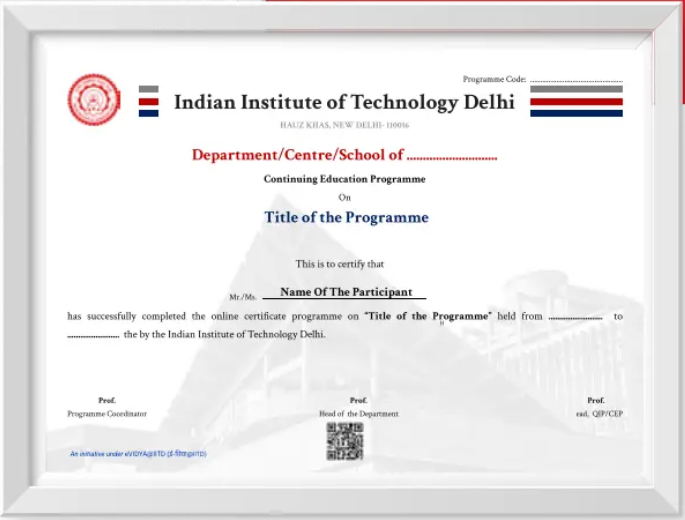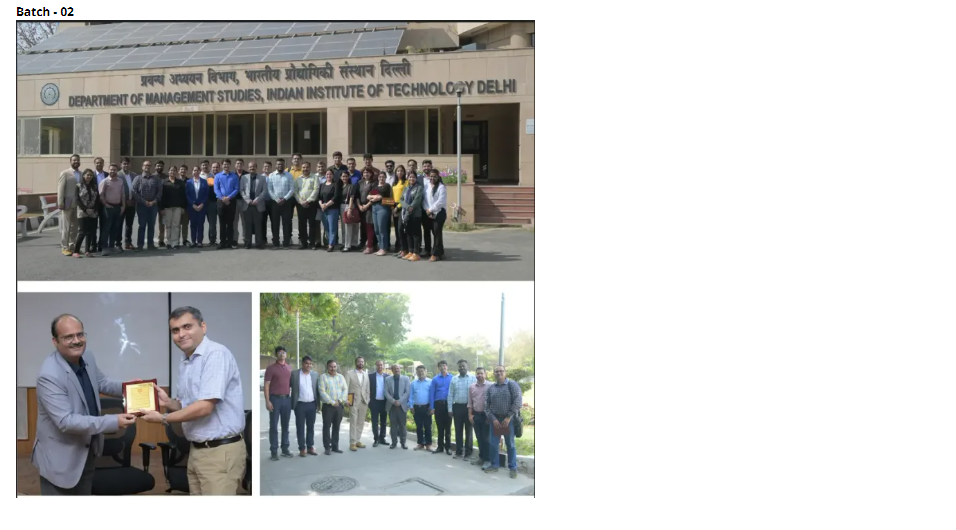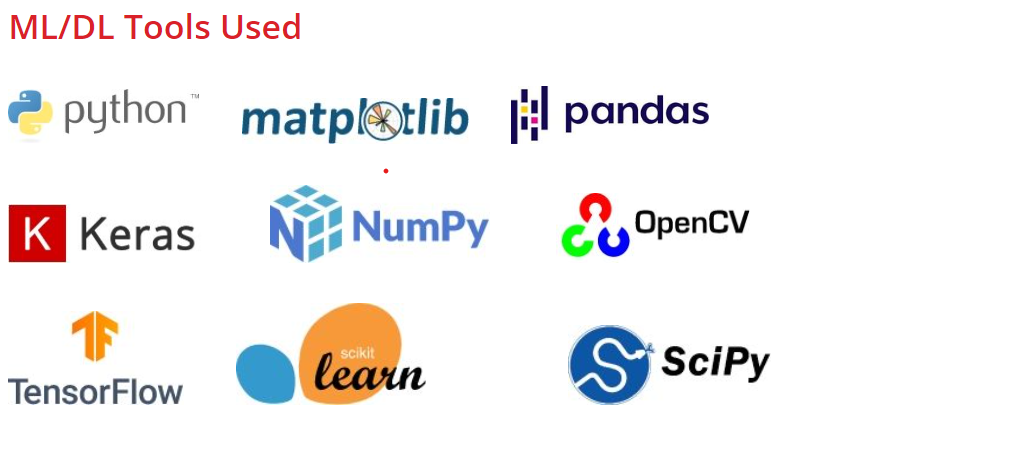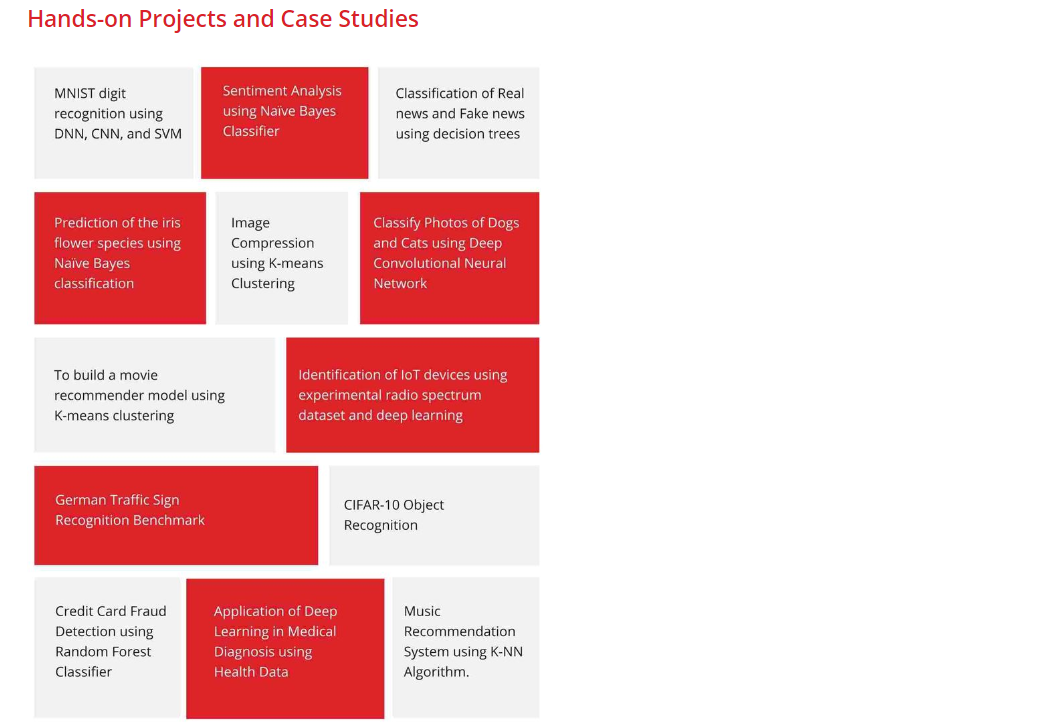IIT Delhi Certificate Programme in Machine and Deep Learning
IIT Delhi Certificate Programme in Machine Learning and Deep Learning
Created By: Team InventModel
Requirements
Who Should Attend?
Graduates from science or engineering background seeking a career in the ML/DL domain
Professionals in the software and IT industry seeking to upskill with ML/DL expertise and applying this intelligent learning tool in their respective fields
Professionals aspiring to work as data engineers, data scientists, machine learning engineers, etc.
Eligibility Criteria
Graduates or Postgraduates in Science, Technology, Engineering or Mathematical Sciences are eligible to apply for this Machine Learning and Deep Learning IIT Delhi programme.
Admission Criteria
Selection for this IIT Delhi Machine Learning and Deep Learning programme is based on application review and interview with the faculty.
Course Description
Program
overview:
The programme is designed to provide candidates with a comprehensive understanding of the motivations, principles, methodologies, and applications of these technologies. It covers essential programming with Python, an introduction to data analytics, applied mathematics, and core modules and applications of machine learning and deep learning in various domains. Secure your future in the exciting field of transformative technologies with IIT Delhi’s Certificate Programme in Machine Learning and Deep Learning. This programme is designed to equip professionals with a comprehensive understanding of machine learning and deep learning techniques, along with their practical applications in addressing real-world business challenges. The IIT Delhi Machine Learning and Deep Learning programme programme encompasses a variety of topics, including supervised and unsupervised learning, deep neural networks, convolutional neural networks, and natural language processing.
Programme Timelines
|
Last Date to Apply |
30th August, 2024 |
|
Programme Start Date |
21st September 2024 |
|
Programme End Date |
29th March, 2025 |
Course Fee: ₹ 1,69, 000 + Taxes
Class Timings: Saturdays and Sundays 10:00 a.m. to 12:00 p.m. (IST).
Duration: The IIT Delhi Machine Learning and Deep Learning programme duration is 6 Months
6 months
76 hours live online sessions
76 hours self-paced
20 hours (3 weeks) capstone project
4-6 hours of masterclasses on ChatGPT
Who Should Attend?
Graduates from science or engineering background seeking a career in the ML/DL domain
Professionals in the software and IT industry seeking to upskill with ML/DL expertise and applying this intelligent learning tool in their respective fields
Professionals aspiring to work as data engineers, data scientists, machine learning engineers, etc.
Eligibility Criteria
Graduates or Postgraduates in Science, Technology, Engineering or Mathematical Sciences are eligible to apply for this Machine Learning and Deep Learning IIT Delhi programme.
Admission Criteria
Selection for this IIT Delhi Machine Learning and Deep Learning programme is based on application review and interview with the faculty.
Certificate and Assessment
Evaluation
The IIT Delhi Machine Learning and Deep Learning course evaluation criteria consists of:
50% - End of programme MCQ-based exam
20% - Assignments/quizzes
20% - Capstone Project
10% - Attendance
Certification
Candidates who score at least 50% marks overall and have a minimum attendance of 50%, will receive a ‘Certificate of Successful Completion’ from CEP, IIT Delhi.
Candidates who score less than 50% marks overall and have a minimum attendance of 50%, will receive a ‘Certificate of Participation’ from CEP, IIT Delhi.
The organising department of this programme is the Department of Electrical Engineering, IIT Delhi.
Sample Certificate
*Only e-certificates will be issued by CEP, IIT Delhi for this programme.



How It Works
Step1: Select course of your interest and register.
Step2: Receive Counselling from our Programme Advisors.
Step3: Get your documents verified and give an Interview if applicable.
Step4: Obtain Offer Letter and Give your Acceptance.
Step5: Pay Preliminary Course Fee.
Step6: Complete Onboarding and commence Course.
Key Highlights of Program
Design and train your custom-built Neural Networks using Keras and TensorFlow.
Masterclasses on ChatGPT.
Learn industry relevant tools
One day campus immersion at IIT Delhi Campus (optional).
76 hours of live online sessions by IIT Delhi faculty and industry experts.
Flexibility to custom create your Capstone Project.
Key Learning Outcomes
Upon successful completion of this IIT Delhi Machine Learning and Deep Learning programme, students would:
Gain an understanding of efficient Python programming, including developing the skills to load and pre-process data from online and offline databases using pandas.
Develop a thorough understanding of the fundamental aspects and challenges of machine learning, such as data, model selection, and model complexity.
Identify the strengths and weaknesses of popular machine learning approaches.
Learn to design and train your own neural networks using Keras and TensorFlow modules.
Acquire the ability to design and implement various machine learning and deep learning techniques in a range of real-world applications.
Programme Delivery
Online Direct-to-Device (D2D).
Campus Immersion
An offline 1-day campus immersion for interaction between faculty and learners in IIT Delhi campus (optional for learners to attend).
Job Roles
Below are the job roles available in this field:
Machine Learning Specialist: Develops algorithms and models for machines to learn from data and make autonomous predictions or decisions.
Deep Learning Specialist: Designs, trains, and optimises neural networks to create and refine complex models.
Data Scientist: Analyses and interprets complex data sets to extract insights and guide business decisions using statistical methods, machine learning, and programming.
Data Analyst: Collects, cleans, and analyses data to identify trends and patterns, providing actionable insights to support business operations and decisions.
AI Engineer: Designs and implements AI systems and applications, including machine learning models, natural language processing algorithms, and computer vision solutions, to automate tasks or enhance human capabilities.


Course Content:
Module 1 - Fundamentals of Python for Machine Learning
Foundations of Python Programming
Functional Programming in Python
Data Structures, Loops, and Control Structures
Learning Outcomes
Covers essential Python programming concepts, including basic syntax and data types, control sequences like loops and conditional statements, and writing functions and classes.
Module 2: Data Processing for Machine Learning
Numerical Computations and Linear Algebra using NumPy
Data Pre-processing using Pandas
Data Visualisation using Matplotlib
Introduction to Scikit-learn
Learning outcomes:
Learn about file handling with python, plotting and visualization with Matplotlib, arrays, and matrices with NumPy, scientific computing with NumPy and, data handling with pandas
Module 3: Mathematical Foundations for Machine Learning
Linear Algebra: Vectors, Matrices, Norms, Subspaces, Projections, SVD, EVD, Derivatives of Matrices, Vector Derivative Identities, Least Squares
Optimization: Constrained and Unconstrained Optimisation, Maxima and Minima, Convex and Non-Convex, Gradient and Hessian, Positive Definite and Semi-Definite, Second Derivative Test, Steepest Descent, Adam, AdaGrad, Respro, and KKT
Probability Theory: Discrete and Continuous Random Variables, Conditional Probability, Joint Probability Distribution, Multivariate, MAP Criterion, and ML Criterion
Learning outcomes:
Gaining an understanding of the mathematical fundamentals crucial for machine and deep learning success, like linear algebra, probability theory, and optimisation methods. In linear algebra, master essential operations involving vectors and matrices and the understanding of eigenvalues and eigenvectors. Probability theory will provide concepts on probability distributions and Bayes' theorem, which is crucial to understanding the probabilistic nature of machine learning algorithms. Furthermore, it delves into optimisation techniques, including gradient descent and convex optimisation, empowering to optimise models and algorithms effectively.
Module 4: Artificial Intelligence Terminologies and Data Analysis
Differences Between Artificial Intelligence, Machine Learning, and Deep Learning
Differences Between Statistical Approach, Shallow Learning, and Deep Learning
Data Types and their properties
Attribute Types
General characteristics of datasets
Data Measurement Criteria: Precision, Bias, and Accuracy
Data Pre-processing Techniques
Distance-based Dissimilarities between Datasets
Learning outcomes:
Understand and differentiate between key concepts like AI, Machine Learning, and Deep Learning. Gain a strong foundation in data properties, types, and characteristics of datasets. Furthermore, you will be able to evaluate data quality using metrics like precision, bias, and accuracy, and explore pre-processing techniques for data preparation.
Module 5: Fundamentals of Machine Learning and Algorithms
Machine Learning Problems: Classification, Regression, Interpolation, and Density Estimation
Linear Regression Model, Classification Model, and Classification Evaluation
Learning Algorithms: Supervised and Unsupervised
Bayesian Decision Theory: Bayesian Classifier, Discriminant Functions, and Minimum Error Rate Classification
Naïve Bayes Classifier
Logistic Regression Model and Parameter Estimation (Maximum-Likelihood)
Dimensionality Reduction Technique: Principal Component Analysis (PCA)
Non-parametric Techniques: K-Nearest Neighbour (KNN) and Density Estimation
K-means Clustering
Decision Tree (Entropy, Gini Impurity Index)
Support Vector Machine (SVM)
Random Forest, Ensemble Learning, Bagging, and Boosting
Learning outcomes:
Gain proficiency in data analysis and visualisation techniques essential for extracting insights from datasets. Dive into various machine learning algorithms, including supervised, unsupervised, and reinforcement learning and tasks such as classification and regression. Understand the theoretical background of supervised methods like Linear and Logistic regression, SVM, decision trees and unsupervised methods, including clustering, KNN, and dimensionality reduction techniques (PCA).
Module 6 - Neural Networks
Neurons, Perceptron Convergence Theorem, Relation Between the Perceptron and Bayes' Classifier, Batch Perceptron Algorithm, Adaptive Filtering Algorithm, Least Mean Square (LMS) Algorithm, Multilayer Perceptron, Feedforward Operation, Batch and On-line Learning, Activation Function, Backpropagation Algorithm, Rate of Learning, Stopping Criteria, XOR Problem, Loss Function, Bias and Variance, Regularization, Cross-Validation, and Early-Stopping Criteria
Demonstration of All Machine Learning Algorithms for Classification and Regression Applications.
Learning Outcomes
Delve into the theory and design of Artificial Neural Networks (ANNs) for classification and regression tasks, mastering essential concepts like backpropagation and stochastic gradient descent for training ANNs. Gain the necessary practical skills to implement all the algorithms using Python libraries like NumPy, pandas, scikit-learn, and Keras.
Module 7 - Fundamentals of Deep Learning, Architectures and Recent Advances
Basics of Deep Learning
Importance of Deep Learning
Learning from Large Datasets
Types of Data and Architectures
End-to-end Model Design for Feature Learning and Decision-Making
Convolutional Neural Network (CNN)
Architecture Design
Training Methodology of CNN
Use Cases
State-of-the-art CNN Models
Python Demo on Object Detection/Image Classification
Recurrent Neural Network (RNN) and Long-Short Term Memory (LSTM)
Modelling of Time-series Data
Architecture Design of RNN
Training Methodology of RNN
Architectures of LSTM and Advantages over RNN
Use Cases
Python Demo on Machine Translation, Stock Prediction
Autoencoder (AE)
Deep Learning for Unsupervised Learning
Architecture Design of AE
Convolutional AE
Training with Unlabelled Data
Use Cases
Python Demo in Denoising and Dimensionality Reduction
Generative Modelling
Subtopic 1 - Variational Autoencoder (VAE):
Fundamentals of Generative Modelling
Architecture of VAE
Estimating Data Distribution
Training Methodology of VAE
Use Cases
Python Demo for Image Generation
Subtopic 2 - Generative Adversarial Network (GAN)
Generative Modelling as a Game-theoretic Approach
Architecture Design of GAN
Training Methodology of GAN
Use Cases
Python Demo on Image Generation and Style Transfer
Subtopic 3 - Diffusion:
Generative Modelling Through Denoising
Architecture Design of Diffusion Models
Training of Diffusion Models
Python Demo on High-quality Image Generation
Attention and Transformer:
Attention Mechanism
Advantages of Attention
Architecture Design of Transformers
Training of Transformer
Python Demo on Language Translation Using Transformer
Special Topics-
Transfer Learning
Leverage Knowledge from One Task to Improve Performance on Another Task
Pre-training on Large Datasets
Fine-tuning DL Models on Small Dataset
Use Cases
Python Demo on Transfer Learning in Computer Vision
Knowledge Distillation
Optimisation of DL Models
Transfer Knowledge from a Complex Teacher Model to a Simpler Student Model
Training Methodology for Distillation
Use Cases
Python Demo on Knowledge Distillation in Computer Vision and Natural Language Processing
Learning Outcomes
Understanding the advantages of deep learning. Gain in-depth knowledge of deep architectures such as CNNs, RNNs, LSTMs, GRUs, Attention mechanisms, Transformers, and Autoencoders. A theoretical and practical understanding of the architectures, along with insights into design choices for better model development. Essential model training concepts like regularisation, dropout, data augmentation, batch normalisation, and hyperparameter tuning are explored for effective optimisation. Popular generative methods for AI applications such as VAEs, GANs, and Diffusion models are discussed alongside advanced topics like transfer learning, knowledge distillation, network pruning, and quantisation. Hands-on demos using TensorFlow and PyTorch on images, text, time series, language data, etc., are included for all architectures, equipping with practical skills to excel in the field of deep learning.
Module 8 - Computer Vision
Industry Use Cases and Applications of Computer Vision
Case Studies in Computer Vision
Latest Trends in Computer Vision
Learning Outcomes
Gain an overview of computer vision and its industry applications.
Module 9 - Speech Recognition
Latest Industry Use Cases and Applications of Speech Recognition
Case Studies in Speech Recognition
Latest Trends in Speech Recognition
Learning Outcomes
Gain fundamental understanding of speech recognition. Acquire the knowledge about applications and latest trends of speech recognitions along with the challenges involved.
Module 10 - Natural Language Processing
Latest Industry Use Cases and Applications of NLP
Case Studies in NLP
Latest Trends in NLP
Learning Outcomes
Get introduced to the concept of NLP. Also, learn about the industry applications and common tasks of NLP.
Capstone Project
Bring Your Own Project
Dates and Fees
Programme Fee
|
Particulars |
Amount (in ₹) |
|
Programme Fee |
1,69,000 |
|
GST @18% |
30,420 |
|
Total Fee |
1,99,420 |
Note:
All fees should be submitted in the IITD CEP Account only, and the details will be shared post-selection.
Withdrawal & Refund from Programme
Candidates can withdraw within 15 days from the programme start date. A total of 80% of the total fee received will be refunded. However, the applicable tax amount paid will not be refunded on the paid amount.
Candidates withdrawing after 15 days from the start of the programme session will not be eligible for any refund.
If you wish to withdraw from the programme, you must email cepaccounts@admin.iitd.ac.in and icare@timespro.com stating your intent to withdraw. The refund, if applicable, will be processed within 30 working days from the date of receiving the withdrawal request.
Instalment Schedule
|
Particulars |
|
Amount (₹)** |
|
Registration Fee |
To be paid at the time of registration |
10,000 |
|
1st Instalment |
Within one-week of offer-rollout |
59,000 |
|
2nd Instalment |
12th November, 2024 |
50,000 |
|
3rd Instalment |
27th December, 2024 |
50,000 |
** GST @18% will be charged extra in addition to the fee.
Easy EMI Options Available
Note:
Registration Fee of ₹10,000 will be charged for processing the selected applications only, post confirmation email from the institute. The registration fee is also part of the total programme fee.
An offer letter from CEP, IIT Delhi will be released post the successful receipt of the Registration Fee.
Payment of fees should be submitted in the IIT Delhi CEP account only and the receipt will be issued by the IIT Delhi CEP account for your records.
Loan and EMI Options are services offered by TimesPro. IIT Delhi is not responsible for the same.
Testimonials
Mathematics can do magic! During my academic years I was just doing the math to pass exams, but after this course, I know now from here where I need to go. I had to go through the recordings 3-4 times but every time I learned something new and understood why IIT is awesome.”
Brajesh
System Administrator
“Now I have an in-depth understanding of how any AI application works. I am confident that I can explore and innovate some new AI-based applications for our OTT/Broadcast industry. Overall, excellent experience and a very knowledgeable faculty.”
Frequently Asked Questions (FAQs)
What is the IIT Delhi Certificate Programme in Machine Learning and Deep Learning?
The IIT Delhi Machine Learning and Deep Learning course is designed to provide candidates with a comprehensive understanding of the motivations, principles, methodologies, and applications of these technologies. It covers essential programming with Python, an introduction to data analytics, applied mathematics, and core modules and applications of machine learning and deep learning in various domains. The programme is designed to equip professionals with the skills and insights needed to navigate the dynamic landscape of ML and DL.
Who is this Machine Learning and Deep Learning IIT Delhi course suitable for?
This Machine Learning and Deep Learning IIT Delhi course is suitable for graduates from science or engineering backgrounds seeking a career in the ML/DL domain and for professionals in the software and IT industry seeking to upskill with ML/DL expertise. This course is also suitable for professionals who aspire to work as data engineers, data scientists, machine learning engineers, etc.
What are the eligibility criteria for the IIT Delhi Certificate Programme in Machine Learning and Deep Learning?
Candidates must have a BE/B.Tech/ME/MTech/BIT/MIT/BCA/MCA/MCM (any stream), OR BSc/MSc/BS/MS in Mathematics, Statistics, Electronics, Physics, Computer Science, AI, DS to apply for this Machine Learning and Deep Learning IIT Delhi programme.
How can I register for the IIT Delhi Certificate Programme in Machine Learning and Deep Learning?
Secure your spot in the course by clicking the "Enrol Now” button and filling in your details. Our team will swiftly connect with you to provide all the information you need.
What topics are covered in the IIT Delhi Certificate Programme in Machine Learning and Deep Learning?
The course covers a range of topics such as Foundations of Python Programming Functional Programming in Python, Data Structures, Loops, and Control Structures, Mathematical Foundations for Machine Learning, Artificial Intelligence Terminologies and Data Analysis, Neural Networks, Fundamentals of Deep Learning, Architectures and Recent Advances, Computer Vision, etc.
What is the teaching methodology followed in the programme?
The teaching methodology for this IIT Delhi Machine Learning and Deep Learning course will be highly interactive, leveraging technology, and deploy diverse pedagogical tools and techniques, including lectures, project work, etc.
Is the IIT Delhi Certificate Programme in Machine Learning and Deep Learning live or recorded?
The IIT Delhi Certificate Programme in Machine Learning and Deep Learning is a live course that will be delivered in a direct-to-device (D2D) mode.
Do I have to pay the complete programme fees in one instalment?
No, the candidates have to pay the registration fee when enrolling for this programme. The rest of the fees can be paid in three easy instalments.
What is the scope of the IIT Delhi Certificate Programme in Machine Learning and Deep Learning in India?
The IIT Delhi Certificate Programme in Machine Learning and Deep Learning in India offers a comprehensive curriculum covering key concepts such as supervised and unsupervised learning, neural networks, natural language processing, computer vision and deep learning. With a focus on practical hands-on experience through projects and case studies, the program equips participants with the skills and knowledge required to excel in the rapidly growing fields of machine learning and deep learning. The certification from a prestigious institution like IIT Delhi adds significant value to one's professional profile, opening up opportunities in sectors like technology, finance, healthcare, and more. Overall, this program provides a solid foundation for individuals looking to pursue a career in artificial intelligence and data science.
Why should you choose IIT Delhi for the Machine Learning and Deep Learning course?
IIT Delhi offers a cutting-edge Machine Learning and Deep Learning course that stands out due to its rigorous academic curriculum, top-notch faculty, and state-of-the-art research facilities. The program emphasises hands-on learning through practical projects and real-world applications, ensuring students gain practical skills alongside theoretical knowledge. Additionally, IIT Delhi's industry collaborations provide valuable networking opportunities and exposure to the latest trends in the field. By choosing IIT Delhi for this course, students can benefit from a holistic learning experience that equips them with the necessary expertise to excel in the rapidly evolving field of artificial intelligence.
What are the benefits of completing this Certificate Programme in Machine Learning and Deep Learning from IIT Delhi?
Completing this certificate programme in Machine Learning and Deep Learning from IIT Delhi can offer several benefits:
High-Quality Education: IIT Delhi is renowned for its academic excellence and rigorous curriculum. By enrolling in this certificate programme, you gain access to top-tier faculty members, cutting-edge research, and a comprehensive curriculum designed to impart in-depth knowledge of machine learning and deep learning concepts.
Prestigious Credential: Obtaining a certificate from IIT Delhi carries significant weight and recognition in the industry. It serves as a validation of your expertise and commitment to mastering machine learning and deep learning techniques, enhancing your credibility and marketability to potential employers.
Comprehensive Curriculum: The programme covers a wide range of topics relevant to machine learning and deep learning, including algorithms, neural networks, natural language processing, computer vision, and more. This comprehensive curriculum ensures that you acquire a strong foundation in both theoretical principles and practical applications of these technologies.
Hands-On Experience: The programme likely includes practical exercises, projects, and case studies that provide hands-on experience with real-world datasets and tools used in machine learning and deep learning projects. This practical exposure helps reinforce theoretical concepts and equips you with the skills needed to tackle complex data analysis and modelling tasks.
Networking Opportunities: IIT Delhi attracts talented students and industry professionals from diverse backgrounds. Participating in this certificate programme allows you to interact with peers, faculty members, and guest speakers who share a passion for machine learning and deep learning. These networking opportunities can lead to valuable collaborations, mentorship, and career connections in the field.
Career Advancement: With the growing demand for professionals skilled in machine learning and deep learning, completing this certificate programme can significantly enhance your career prospects. Whether you are seeking to advance in your current role, transition to a new career path, or start your own venture in artificial intelligence, the knowledge and credentials gained from this programme can open doors to exciting opportunities in various industries.
What is the refund policy if a student needs to withdraw from the IIT Delhi Certificate Programme in Machine Learning and Deep Learning course?
Students can request a withdrawal within 15 days from the start of the program, and they will receive a refund of 80% of the total fee paid. However, taxes paid on the amount will not be refunded. If a withdrawal is requested after this 15-day period, no refund will be applicable. To initiate a withdrawal, please send an email stating your intent to withdraw to cepaccounts@admin.iitd.ac.in and icare@timespro.com.
Reference taken from: https://timespro.com/executive-education/iit-delhi-ai-and-machine-learning-for-industry

00 Minutes On Demand Video
Full lifetime access
Access on mobile and TV